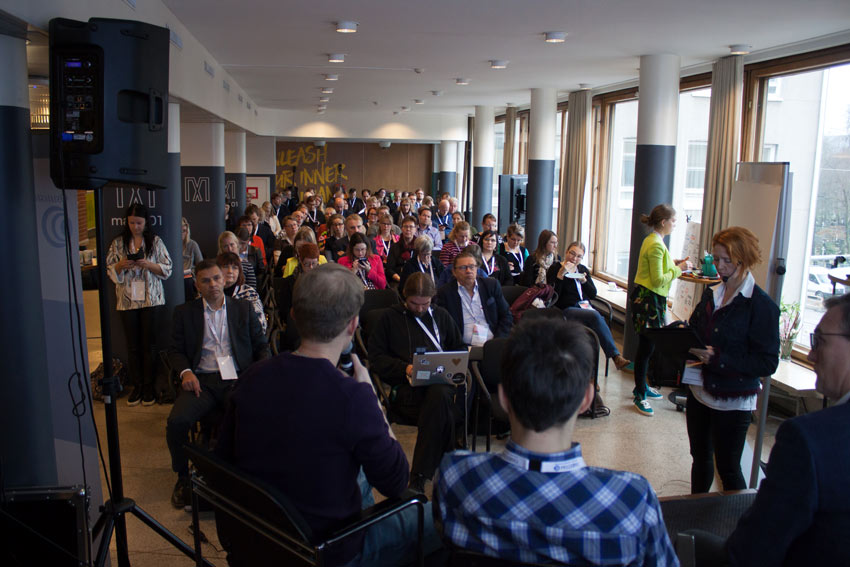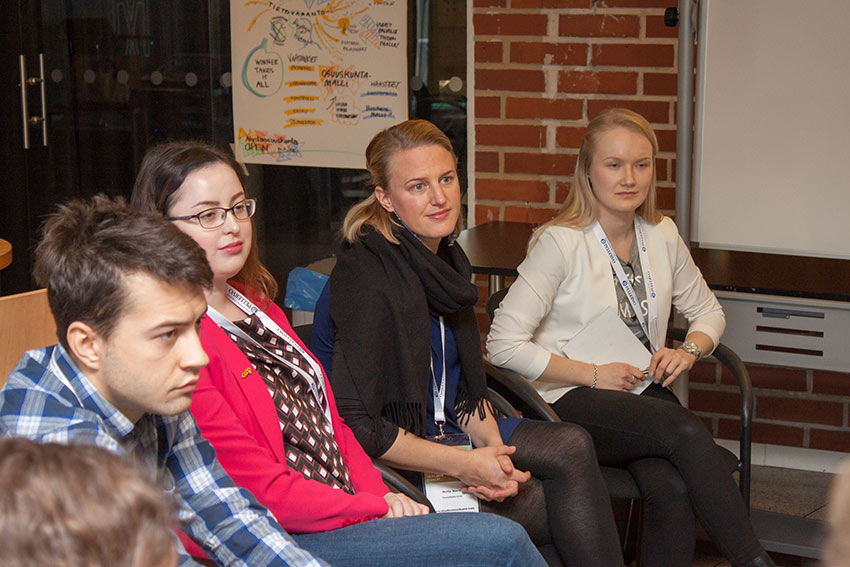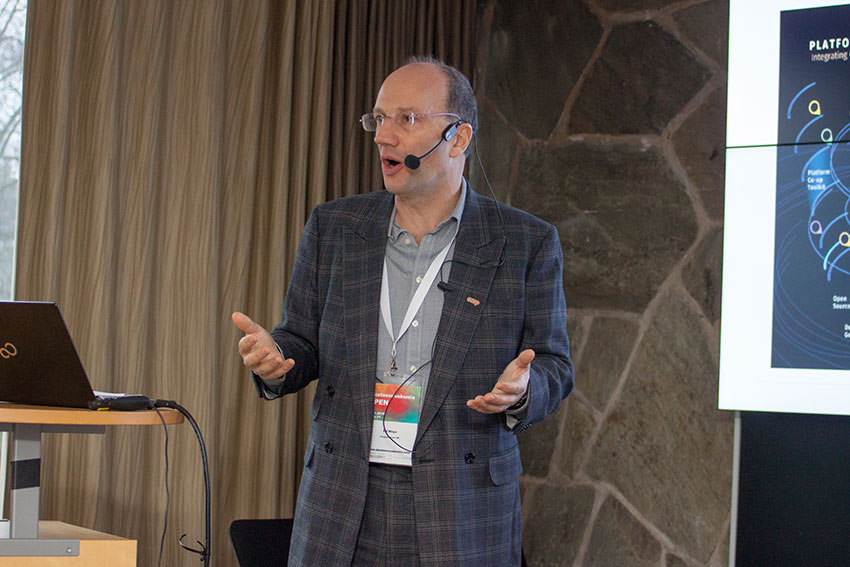Platform economy revolutionizes business. An enormous amount of value is created on platforms like Über or Airbnb by their users – consumers and especially those producing the service. But to whom does the added value go to and who decides on the operating principles of the platform?
Pellervo Coop Center organized an event in Helsinki on the 14th of November 2018 called Platfrom Cooperative OPEN where we discussed the meaning of ownership and how we can together build a more communal and sustainable market economy.
Revolutionizing ownership
“We are still on the installation phase and the biggest change is yet to come. Now is a good time to think about these issues” emphasized Iiro Jussila, CEO of Pellervo Economic Research – PTT. “Technology is breaking into new territories and is a core generator of added-value in the future”.
According to Jussila we have moved from the economy of transactions to platform economy where the interactions between people and between people and technology are at the center. “Roles between stakeholders are no longer self-evident. Ownership rises as a major theme – especially shared ownership. The interesting thing is, what is the role cooperatives in this change.”
Platform cooperatives around the world
Platform economy revolutionizes business. An enormous amount of value is created on platforms like Über or Airbnb by their users – consumers and especially those producing the service. But to whom does the added value go to and who decides on the operating principles of the platform?
Pellervo Coop Center organized an event in Helsinki on the 14th of November 2018 called Platfrom Cooperative OPEN where we discussed the meaning of ownership and how we can together build a more communal and sustainable market economy.

Revolutionizing ownership
“We are still on the installation phase and the biggest change is yet to come. Now is a good time to think about these issues” emphasized Iiro Jussila, CEO of Pellervo Economic Research – PTT. “Technology is breaking into new territories and is a core generator of added-value in the future”.
According to Jussila we have moved from the economy of transactions to platform economy where the interactions between people and between people and technology are at the center. “Roles between stakeholders are no longer self-evident. Ownership rises as a major theme – especially shared ownership. The interesting thing is, what is the role cooperatives in this change.”
Platform cooperatives around the world
“The only way to respond to the challenges of sharing economy – i.e. platform capitalism – is by changing ownership, creating a democratic governance structure and strengthening solidarity”, Secretary General Ed Mayo from Cooperatives UK reminded. Cooperatives UK has been involved in creating a business accelerator for platform cooperatives in the UK.
The definition of a platform cooperative is quite simple, according to Mayo. “A platform cooperative is a jointly owned and democratically controlled business that uses a digital platform that helps people meet their needs or solve a problem by bringing together people and capital.”
This is so Finnish!
There are already many platform cooperatives around the world that strive to create a more sustainable platform economy. Mayo believes Finland could be the model country of platform cooperatives because we have both the technological know-how and a lot of cooperative spirit.
“Large platform companies like Google and Facebook might seem like superior opponents but tech-companies just don’t realize the potential of cooperatives. But the change will come and when it does, the cooperative movement has to be ready.”
Platforms are the future
OP Cooperative Group has realized the change in customer behavior and competition environment and wants to be a leader in the emerging new market. “The goals is to utilize open interfaces and make sure OP remains an interesting partner and create new innovative and completely digital services”, says development director Tomas Granlund.
OP bank has already released all its major services as interfaces and brought the services and data sources of others as part of its own services and done a lot of cooperation. “We are ready to open our data to our partners. In the platform economy you must be ready to let go of the old way to own the whole value chain yourself. Also, sharing profits is important to ensure the growth of the platform,” Granlund emphasized
Coop is good for owning data
Cost savings and efficiency are not the main benefits of a platform but the opening of interfaces that create something completely new to the value chain. “The biggest change is not that we are able to collect data, but that completely new data and new ways to earn are created”, says platform economy researcher Leena Ilmola-Sheppard.
According to her, a typicalplatform does not even need a lot of investments. “There is no point in creating your own code, because you cannot compete with large corporation on that. You need to learn how to utilize the existing resources. The true challenge is to build an even better business concept from that code.”
Ilmola-Sheppard believes that a cooperative is quite an obvious choice as a business model in platform economy. “When a company joins a platform, usually they want to ensure the transparency of operations and decision-making and that someone does not come and take over the business or the platform”.

Panel discussion was optimistic
The morning ended in a panel that discussed the theme “Revolution of ownership – are platform cooperatives the answer?”. CEO Juho Makkonen from Sharetribe wanted to democratize the whole sharing and platform economy. “Even though, young people are not interested in owning things, they do care who owns the companies whose services they use”.
According to him cooperatives can also make much better pricing models because the profit stays in the community.
The other panelist, platform cooperatives entrepreneur Leo Sammallahti reminded that platforms as such are not the problem but the tension between users and owners. In a cooperative these two are combined. Ilmola-Sheppard also joined the panel and pondered how they are now trying to control platforms in the EU and pointed out how the law-makers are always 3-4 years behind. OP’s Granlund took part in the panel and said that we need to just be brave and try different approaches and think where cooperatives are strong and and what the giant corporations cannot offer, such as locality and the Finnish language.
Platform cooperatives in practice
In the afternoon the participants were divided into workshops, where the idea was to think what platform cooperatives are in practice. The themes were: what kind of platform cooperatives does Finland need and how can we promote the sense of community with platform cooperatives. One workshop dealt with the current issue of data ownership and how can platform cooperatives be the solution.
Cooperatives are changing
There were over 80 participants in the Platfrom Cooperative OPEN event from small and large cooperatives to associations and universities. Professor Jukka Mähönen gave the last conclusions and reminded us all at the end that even though the game is changing, nobody will necessarily lose. “The core of the cooperative business has been for the past 150 years to combine owning and using. Once again, it is just taking a new form in platforms.”
Pictures and materials of the event: www.alustaosuuskunta.com

